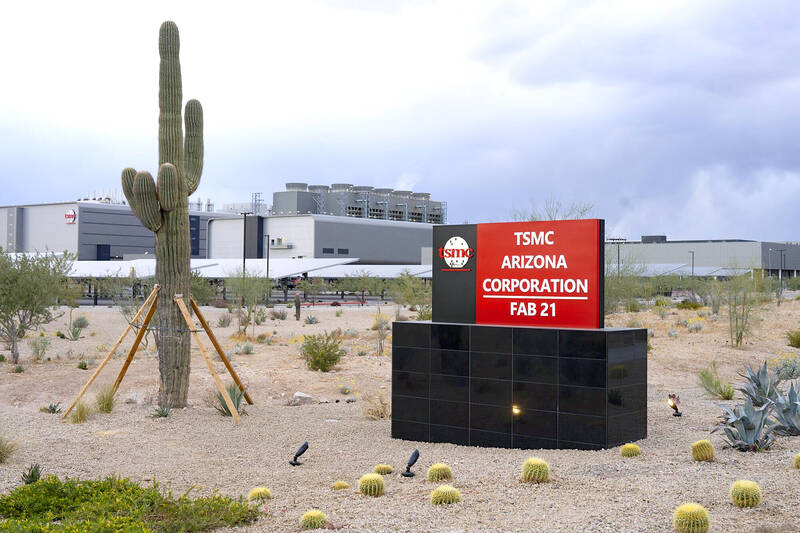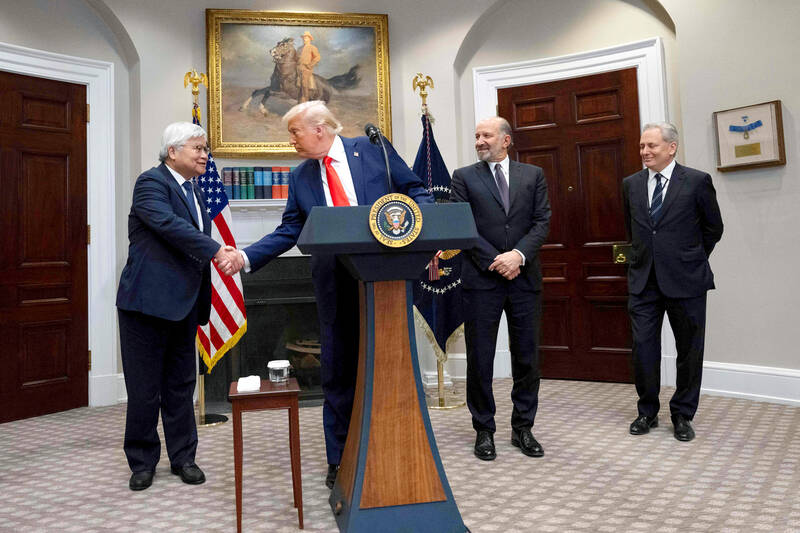Taiwanese chip-making giant Taiwan Semiconductor Manufacturing Co (TSMC) plans to invest a whopping US$100 billion in the US, after US President Donald Trump threatened to slap tariffs on overseas-made chips.
TSMC is the world’s biggest maker of the critical technology that has become the lifeblood of the global economy.
This week’s announcement takes the total amount TSMC has pledged to invest in the US to US$165 billion, which the company says is the “largest single foreign direct investment in US history.”

Photo: Bloomberg
It follows Trump’s accusations that Taiwan stole the US chip industry and his threats to impose tariffs of up to 100 percent — and Taipei’s promises to invest more in the US.
The following is a look at what TSMC’s investment could mean for Taiwan.
‘SILICON SHIELD’

Photo: AFP
Semiconductor chips are used in everything from smartphones and televisions to electric vehicles and missiles — and more than half of them are made in Taiwan.
The concentration of chip manufacturing has long been seen as a “silicon shield” protecting the country from an invasion or blockade by China — and an incentive for the US to defend it.
China has upped military pressure on Taiwan in recent years to press its unfounded claim of sovereignty over the country, where TSMC has its headquarters and the bulk of its fabrication plants.
That has fueled calls for the firm to move more of its production out of the country to avoid supply disruptions if China did attack. Trump recently warned of import levies of 25 percent, or higher, on overseas-made chips, which one analyst has said could trigger a recession in the industry.
While TSMC’s latest investment might deflect the threat of tariffs, there are fears it could hurt Taiwan’s economy and weaken its “silicon shield.”
“The more TSMC produces in the United States, the less important Taiwan will be in geopolitics and the less incentives the United States will have to help Taiwan in the future,” said Ko Ju-chun (葛如鈞), a lawmaker with the main opposition Chinese Nationalist Party.
CONTROL OF TSMC
Taiwan’s leaders are aware of the risks as they try to stay onside with their most important security backer Washington and protect the nation’s status as a chip-making powerhouse.
President William Lai (賴清德) office said Tuesday the government would review TSMC’s deal “in accordance with the law” and ensure that the “most advanced” chip-making processes stayed in Taiwan.
TSMC had already pledged to invest more than US$65 billion in three factories in the US state of Arizona, one of which began production late last year. The US$100 billion investment will be used to expand its US footprint further, with three new fabrication plants, two advanced packaging facilities and a research and development team center.
Richard Hu (胡瑞舟), deputy director of the Taiwan Center for Security Studies think tank, said Trump wanted to prevent TSMC from falling into China’s hands and to make it a “technological asset of the United States.”
“Trump’s ultimate goal is to ensure that the US can fully or critically control TSMC’s semiconductor production, making it a de facto part of America’s chip industry,” Hu said.
DEFENSE GUARANTEES
Taipei security analyst Su Tzu-yun (蘇紫雲) was more optimistic, saying that TSMC’s investment would make Taiwan “safer” and help grow the chip industry.
It would also build trust between Taipei and Washington, and ease Trump’s concerns about US economic security, said Su, from the Institute for National Defense and Security Research.
“I think the importance of Taiwan is not only TSMC but also the geostrategy,” Su said, noting the importance of global shipping lanes near Taiwan.
However, James Yifan Chen of Tamkang University said higher manufacturing costs in the US would drive up prices of products using TSMC chips.
And there were no guarantees the investment would make the mercurial Trump more inclined to defend Taiwan.
“The deal’s effect on US willingness to defend Taiwan is unclear,” said Sung Wen-Ti (宋文笛), a nonresident fellow with the Atlantic Council’s Global China Hub.
“It really depends on how Trump feels on any particular day, and whether Beijing will attempt to outbid Taiwan subsequently.”

Growing up in a rural, religious community in western Canada, Kyle McCarthy loved hockey, but once he came out at 19, he quit, convinced being openly gay and an active player was untenable. So the 32-year-old says he is “very surprised” by the runaway success of Heated Rivalry, a Canadian-made series about the romance between two closeted gay players in a sport that has historically made gay men feel unwelcome. Ben Baby, the 43-year-old commissioner of the Toronto Gay Hockey Association (TGHA), calls the success of the show — which has catapulted its young lead actors to stardom -- “shocking,” and says

The 2018 nine-in-one local elections were a wild ride that no one saw coming. Entering that year, the Chinese Nationalist Party (KMT) was demoralized and in disarray — and fearing an existential crisis. By the end of the year, the party was riding high and swept most of the country in a landslide, including toppling the Democratic Progressive Party (DPP) in their Kaohsiung stronghold. Could something like that happen again on the DPP side in this year’s nine-in-one elections? The short answer is not exactly; the conditions were very specific. However, it does illustrate how swiftly every assumption early in an

Inside an ordinary-looking townhouse on a narrow road in central Kaohsiung, Tsai A-li (蔡阿李) raised her three children alone for 15 years. As far as the children knew, their father was away working in the US. They were kept in the dark for as long as possible by their mother, for the truth was perhaps too sad and unjust for their young minds to bear. The family home of White Terror victim Ko Chi-hua (柯旗化) is now open to the public. Admission is free and it is just a short walk from the Kaohsiung train station. Walk two blocks south along Jhongshan

Jan. 19 to Jan. 25 In 1933, an all-star team of musicians and lyricists began shaping a new sound. The person who brought them together was Chen Chun-yu (陳君玉), head of Columbia Records’ arts department. Tasked with creating Taiwanese “pop music,” they released hit after hit that year, with Chen contributing lyrics to several of the songs himself. Many figures from that group, including composer Teng Yu-hsien (鄧雨賢), vocalist Chun-chun (純純, Sun-sun in Taiwanese) and lyricist Lee Lin-chiu (李臨秋) remain well-known today, particularly for the famous classic Longing for the Spring Breeze (望春風). Chen, however, is not a name